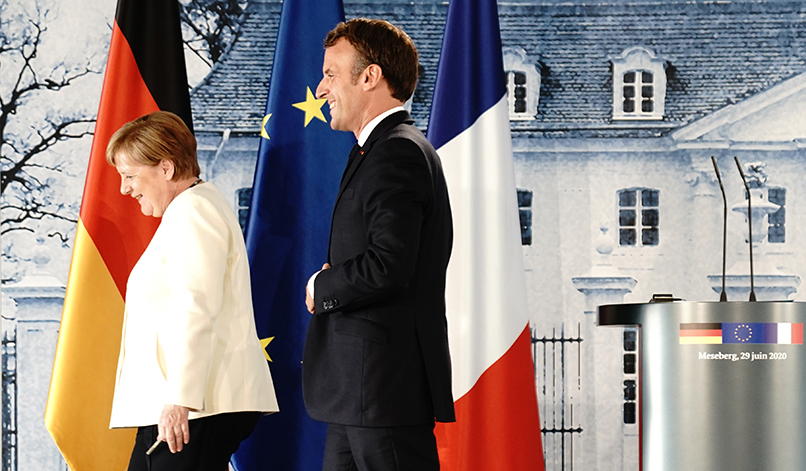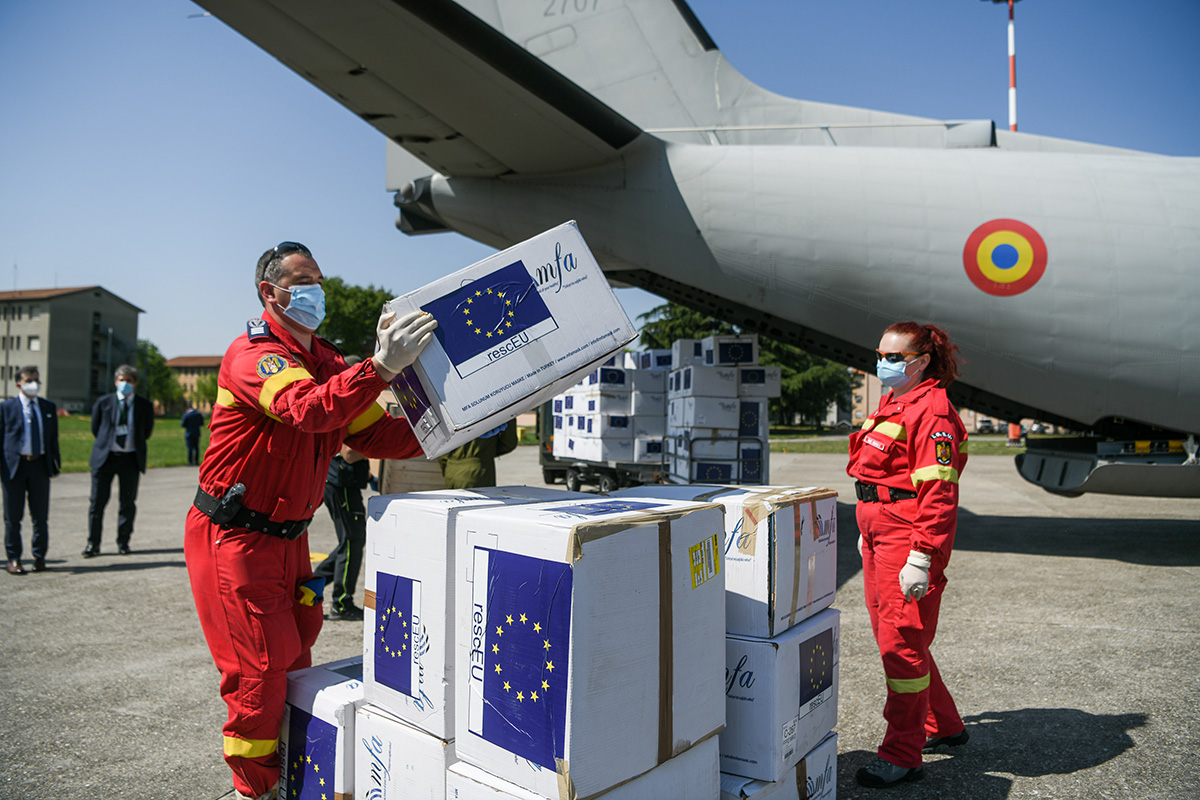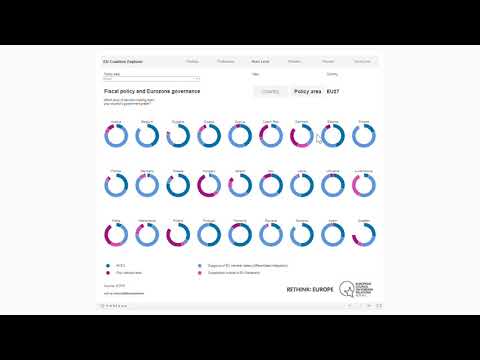EU Coalition Explorer
The EU Coalition Explorer presents the results of the EU27 Survey conducted by the European Council on Foreign Relations in the 27 member states of the European Union. It illustrates the expert opinions of more than 800 respondents who work on European policy in governments, think-tanks, academia, the media, and elsewhere. The Coalition Explorer creates a visual understanding of the views held by Europe’s professional political class – information that otherwise is not available to policymakers or the public.
Across 20 policy areas, the EU Coalition Explorer shows the potential for future coalition building between EU member states. The interactive tool can be used to locate the EU’s political centre – or centres – from which a more capable and cohesive European Union can be built.
The 2020 edition of the EU27 Survey ran from 11 March to 28 April 2020. The EU Coalition Explorer 2020 was published on 8 July 2020.
FAQ
What is the EU Coalition Explorer?
The EU Coalition Explorer is an interactive tool for exploring coalition building in the European Union. It illustrates the results of ECFR’s EU27 Survey of more than 800 professionals who work on European policy in governments, think-tanks, academia, the media, and elsewhere. It is an open resource to explore the survey results for the EU as a whole and for individual member states.
The 2020 edition of the EU Coalition Explorer has four main chapters: Preferences, Actor Level, Priorities, and Partners. Additional sections present the results of a supplemental expert survey on European cooperation in the coronavirus crisis and more detailed information on national policy intentions collected by ECFR’s associate researchers.
How do I use the explorer?
Whereas previous versions of the EU Coalition Explorer were presented in PDF format, the 2020 edition has been created as an interactive online tool using Tableau. The menu along the top of the tool displays the explorer’s central chapters. By clicking on the titles, you can jump directly to any of the chapters. Within each chapter, additional menus allow for sorting the information by question, policy area, country, and other variables. Tooltips provide additional information on individual data points.
Why did you conduct a survey on EU coalition building?
Europe’s capacity to act collectively has become an increasingly critical issue as both the importance of intergovernmental decision-making and the level of political fragmentation have grown over recent years. Against this backdrop, a debate has started in member state capitals and the EU at large as to how the union can evolve and move forward. The surveys and the presentation of their results aim to inform the debate on how a more capable and cohesive EU can be built.
Why are coalitions important?
A multi-speed Europe of differentiated integration with a progressive core and an associated periphery could serve as a template for future cooperation and solidarity within the EU and Europe at large. One could also imagine multiple, sometimes overlapping, coalitions of the willing for deeper integration in particular policy areas, with others prioritising different areas for closer cooperation. With our survey and the EU Coalition Explorer we aim to present the coalition potential of EU member states – both for coalitions that have visibly shaped European policy in the past and for those that may have been overlooked due to lack of data and accessible visualisation.
Why did you invite “experts” to answer the questions?
The label “expert” is intentionally used to describe our survey. In contrast to public opinion polls with national representative samples, this survey aims to capture the views and insights of policy professionals. In the debate on the future of Europe, the views of Europe’s political class – the professionals inside and outside government who work directly on policy or follow politics as expert observers – are central to understanding the dynamics that shape cooperation in the EU. The EU27 Survey and EU Coalition Explorer therefore complement ECFR’s public opinion research, the Unlock project.
What is the Policy Intentions Mapping for?
The 2020 edition of the EU Coalition Explorer is accompanied by a mapping of the EU’s 27 national governments’ preferred policy outcomes across 20 policy areas. It complements the results of the expert survey. For example, while the Coalition Explorer documents whom policy professionals consider their key partners in particular policy areas, the Policy Intentions Mapping provides a reality check on whether preferences align in substance.
What is the Coronavirus Special for?
The Coronavirus Special presents the results of a supplemental EU27 expert survey on European cooperation in the coronavirus crisis, which ran from 4 to 25 May 2020. The goal of this survey was to provide a glimpse into what happened to European cooperation as the pandemic reached its height. As a case study of European cooperation, the Coronavirus Special provides a reality check to the data collected in the Coalition Explorer 2020 and should be treated as a complementary tool.
What is the UK Special for?
The UK Special presents the results of a supplemental survey of British policy professionals and expert observers of European affairs on the United Kingdom’s relationships with the European Union and its member states. The survey ran from 27 March to 11 May 2020. The European Council on Foreign Relations asked policy experts about their personal vision for the UK’s future role in global politics, as well as their assessment of the UK government’s cooperation preferences, policy priorities for cooperation with the EU27, and favoured partners in various policy areas.
How and when was the survey conducted?
The EU27 Survey and the supplemental survey on the coronavirus crisis were conducted through anonymous online questionnaires in which every question was mandatory to complete the survey. The invitations were sent by email to foreign ministries, government and parliament offices, think-tanks, research institutions, journalists, and other organisations working on European policy. Upon our request, a number of recipient institutions and individuals distributed the invitation within their professional networks or departments.
The 2020 edition of the EU27 Survey ran from 11 March to 28 April 2020 and comprised 15 individual questions. A total of 845 respondents answered at least the first substantive survey question. Of those, 684 participants completed the questionnaire. The distribution of respondents across EU member states, professional backgrounds, and areas of expertise can be viewed in the tool under “Survey Info”. All results displayed in the EU Coalition Explorer are based on the total number of responses to that respective question.
The Coronavirus Special of the EU27 Survey ran from 4 to 25 May 2020 and 7 individual questions. A total of 744 respondents answered at least the first substantive survey question. Of those, 677 participants completed the questionnaire
Research on national policy intentions across 20 policy areas was conducted by ECFR’s associate researchers between 9 March and 27 May 2020. The results are based on interviews with experts and policy professionals as well as on reviews of primary sources, such as government documents and party manifestos.
Publications & Downloads

Europe’s green moment: How to meet the climate challenge
Susi Dennision, Rafael Loss, Jenny Söderström – 20 April 2021
Member states are not divided into two diametrically opposed camps. This makes the implementation of the European Green Deal an intricate puzzle – yet achievable.
EU Coalition Explorer 2020 data set
Raw data (XLSX, 3.67 MB) Questionnaire (PDF, 687 KB)

The big engine that might: How France and Germany can build a geopolitical Europe
Jana Puglierin, Ulrike Franke – 14 August 2020
The EU Coalition Explorer survey reveals the importance of Germany and France within the EU, and the impact they can have when they cooperate with each other.

In sickness and in health: European cooperation during the coronavirus crisis
Pawel Zerka – 8 July 2020
ECFR research into how EU member states and institutions worked together at the height of covid-19 confirms Germany was the bloc’s undisputed crisis leader
EU Coalition Explorer 2018
Interactive PDF (71 MB). Navigation and viewing experience optimised for Adobe Acrobat.
PDF (71 MB) Data set (1.5 MB)
EU Coalition Explorer 2016
Interactive PDF (61.5 MB). Navigation and viewing experience optimised for Adobe Acrobat.
PDF (61.5 MB) Data set (1.5 MB)
The invisible web from interaction to coalition-building in the EU by Josef Janning & Christel Zunneberg– 22th May, 2017
Survey of experts in 28 capitals illuminates the complex network of relationships among EU member states.
PDF
EU28 Survey 2015 data
Download a presentation of the 2015 data from the EU28 Survey.
Download
Related content
2021
- Germany at the helm: How Berlin kept Europe together in 2020. By André Hein
- Wie weiter nach dem Brexit? Ulrike Franke und Rafael Loss
2020
- How Britain and the EU could cooperate on defence after Brexit. By Ulrike Franke
- How UK-EU trade cooperation can survive Brexit. By Euan Carss
- Warming relations: UK-EU climate cooperation after Brexit. By Rafael Loss
- On the rocks: Malta-EU relations in times of crisis. By Daniel Mainwaring
- Bubble trouble: Estonia and the coronavirus crisis. By Viljar Veebel
- Latvia during covid: How success bred complacency. by Aleksandra Palkova
- Lithuania’s pandemic: The power of regional cooperation. By Justinas Mickus
- The Swede spot: Why Stockholm needs flexible coalitions. By Pawel Zerka
- Why Germany lost its way on climate policy. By Claire Busse & Rafael Loss
- The provincial German-Polish relationship. By Piotr Buras
- How Germany could break the migration deadlock. By Clara Sophie Cramer
- United in distrust: How France and Poland can repair their broken relations. By Pawel Zerka
- The frugal blues: An underappreciated threat to the European project. By Pawel Zerka
- EPC Podcast: The renewed Franco-German partnership and its potential to build a geopolitical Europe, with Ulrike Franke and Jana Puglierin
- Brexit as perpetual motion: Why Boris Johnson will never stop fighting the EU. By Rafael Loss
- How the frugal four could grow in number and influence by Catharina Sørensen
- Podcast: Where there’s a will, there’s a way: France, Germany and EU coalition building, with Ulrike Franke & Pawel Zerka
- Why Finland never joined the frugal four. By Hanna Ojanen
- How “frugality” hurts the climate cause – and how to undo the damage. By Rafael Loss
- Poland in the EU: How to lose friends and alienate people. By Pawel Zerka
- Beware of mission-accomplished syndrome: Germany and European defence. By Ulrike Esther Franke
- Why Europe needs a recovery plan for strategic autonomy. By Ulrike Esther Franke & Jana Puglierin
- The limits of “no, no, no”: Why the Dutch are so ambivalent about Europe. By Caroline de Gruyter
2019
- Dutch leadership: the end of mere pragmatism? By Niels van Willigen
- German leadership deferred. By Anna-Lena Kirch
- Pioneer and far: Estonia’s European ambitions. By Viljar Veebel
- The unwavering European: Spain and its place in Europe. By Laia Mestres
- Will Poland be an enfant terrible of the post-Brexit EU? By Adam Balcer –
- Brexit bravado: Can the UK build a new continental coalition? By Euan Carss
- Can Europe create strong energy and climate coalitions? By Marin Lessenski
- Italy in the EU: shared priorities, provocative politics. By Federico Solfrini
- Austria’s toughest EU presidency. By Sofia Maria Satanakis
- Hungary for more: Viktor Orbán’s new European battles. By Zsuzsanna Végh
- Can Slovakia and the Czech Republic overcome Europe’s east-west divide? By Almut Möller & Milan Nič
- Cherry-picking Europe: Migration and economic management in Malta. By Daniel Mainwaring
- Dutch courage: Is the Netherlands overconfident in its EU influence? By Josef Janning
- A networked Union: in search of power couples. By Christoph Klavehn
- Wall in: Eurosceptic challenge in Croatia. By Robin-Ivan Capar
- Belgium’s integration blues. By Simon Desplanque
2018
- Latvia’s controlled discontents. By Karlis Bukovskis
- Romania ahead of the EU presidency. By Luka Orešković
- True North: Finland’s commitment to the European project. By Almut Möller
- Loss adjustment: European politics realigns for Brexit. By Josef Janning
- Living on the edge: Could Bulgaria ally with the Visegrád Group? By Daniel Stefanov
- Slovenia’s Greta Garbo syndrome. By Marko Lovec
- Rome alone? Italy’s weak coalition networks. By Almut Möller
- Brothers in arms: Poland and Hungary seek to transform the EU. By Josef Janning
- Podcast: Close contact? Coalition building in the EU with Christoph Klavehn, Josef Janning, Mark Leonard, and Almut Möller
- Czechs and balances: Can Berlin shake up the Visegrád group? By Almut Möller
- Portugal: A good European in search of friends. By Almut Möller
- The overconfident new president: Austria’s coalition-building challenges. By Josef Janning
- The roots of coalitions: Like-mindedness among EU member states. By Josef Janning
- Mimicking membership: London’s need for a new coalition-building strategy. By Almut Möller
- The “more Europe” core four. By Josef Janning
- Consensus and the Franco-German engine: New perceptions of European cooperation. By Almut Möller
- Migration dominates EU priorities through 2023. By Josef Janning
2017
- The end of Angst: Germany is ready to lead in Europe. By Josef Janning
- German-Dutch relationship key to EU coalition building. By Christel Zunneberg
- EU Coalition Explorer – Der interaktive Datenatlas
- An interconnected outlier: the unaccounted costs of Brexit. By Christoph Klavehn
- What are the dynamics between EU heavyweights in the face of Brexit? By Christel Zunneberg
Acknowledgements
We are grateful to the countless experts and policy professionals who took the time to answer our questionnaires and share their expertise and insights on European affairs. For their support and contributions to the Policy Intentions Special, we thank ECFR’s associate researchers: Adam Balcer, Vladimir Bartovic, Karlis Bukovskis, Robin-Ivan Capar, Léonard Colomba-Petteng, Simon Desplanque, Björn Fägersten, Lívia Franco, Andrew Gilmore, Tuomas Iso-Markku, Marin Lessenski, Marko Lovec, Radu Magdin, Daniel Mainwaring, Laia Mestres, Justinas Mickus, Matej Navrátil, Christine Nissen, Ylva Petterson, Martin Quencez, Jonas Richter, Sofia-Maria Satanakis, Hüseyin Silman, Federico Solfrini, Cassiopée Thuin, George Tzogopoulos, Niels van Willigen, Viljar Veebel and Zsuzsanna Végh. We also thank Christoph Klavehn, Loran Lifshits, and Christoph Maurer for helping us make sense of and visualise the data. Finally, we thank our colleagues at ECFR for their helpful comments and suggestions on the project and Sophie Rau and Stiftung Mercator for their enduring support of ECFR and Rethink: Europe.
The European Council on Foreign Relations does not take collective positions. ECFR publications only represent the views of their individual authors.

